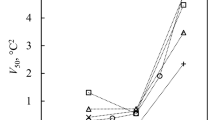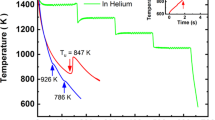Abstract
As a result of some experiments on the deposition of water vapour at low temperatures, it was found that the liquid phase can frequently exist much further below the freezing-point than was expected. For example, droplets of super-cooled water can be obtained at – 50° C. without difficulty. It appeared also that the number of nuclei in atmospheric air on which water vapour could form ice crystals without the previous formation of droplets was small, and they appear to be active only below about – 40° C. Arrangements were therefore made to repeat Prof. C. T. R. Wilson's classical experiments below the freezing-point, both in thoroughly clean air and in ordinary atmospheric air. The following results were obtained:
This is a preview of subscription content, access via your institution
Access options
Subscribe to this journal
Receive 51 print issues and online access
$199.00 per year
only $3.90 per issue
Buy this article
- Purchase on Springer Link
- Instant access to full article PDF
Prices may be subject to local taxes which are calculated during checkout
Similar content being viewed by others
Author information
Authors and Affiliations
Rights and permissions
About this article
Cite this article
CWILONG, B. Sublimation in a Wilson Chamber. Nature 155, 361–362 (1945). https://doi.org/10.1038/155361b0
Issue Date:
DOI: https://doi.org/10.1038/155361b0
This article is cited by
-
Ultra-purification by Separation of Aerosol Particles
Nature (1965)
-
Jet streams, thunderstorms, and Project Skyfire
Archiv für Meteorologie, Geophysik und Bioklimatologie Serie A (1955)
-
Die Eiskeimbildung bei Temperaturen unter −30° C
Geofisica Pura e Applicata (1954)
Comments
By submitting a comment you agree to abide by our Terms and Community Guidelines. If you find something abusive or that does not comply with our terms or guidelines please flag it as inappropriate.



